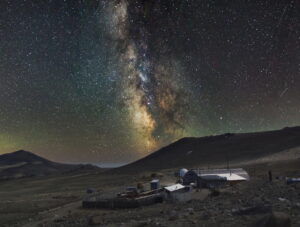Upcoming Events
Events are open to all members and the general public. Sign up for email event updates by registering with Night Sky Network.
Most of our events happen at the Chabot Space and Science Center. Get directions here.
Next General Meeting
(Note that this meeting will be hybrid, in-person and on zoom/facebook. Our speaker will join us IN PERSON in Classroom 3 & 4 / Kepler-Copernicus), as well as in our on-line meeting.
Meeting will be held at the Chabot Space and Science Center Classroom 4 (the Room formerly known as Copernicus). Please enter through the side gate along the back road of the facility.

TITLE: The Dragonfly mission to Titan, and the search for life in other liquids.
The Dragonfly mission to Titan is under construction and scheduled to launch in July 2028. Titan is the largest Moon of Saturn and has a rich organic chemistry with lakes of liquid methane and ethane on its surface. The goals of the Dragonfly include the search for signs of life including life based on liquid methane and ethane.
Marsha Kirschbaum, an avid astro-landscape and deep-scape photographer, will talk about some of the science of auroras and her experiences photographing the Aurora in Alaska and California. She will talk about the equipment she used; camera settings, and how to prepare for and protect your camera and body in the cold should one head north for an Aurora experience.
About the Speaker
Chris McKay is a senior scientist with the NASA Ames Research Center. His research focuses on life in extreme environments and the search for life on other worlds in our Solar System. He is also actively involved in planning for future Mars missions including human exploration. Chris been involved in research in Mars-like environments on Earth, traveling to ice-covered lakes in Antarctica, permafrost in the Siberian and Canadian Arctic, many deserts including the Atacama, Namib, & Sahara Deserts to study life in these extreme environments. He was a co-investigator on the Huygens probe to Saturn’s moon Titan in 2005, the Mars Phoenix lander mission in 2008, and the Mars Science Laboratory mission, in 2012, and the Dragonfly mission to Titan which will arrive in 2034.
https://www.nasa.gov/content/chris-mckay
This talk will be available live and publicly at:
Telescope Makers’ Workshop
The Telescope Maker’s Workshop is one of few regularly scheduled such workshops in the world! Every Friday from 7 to 10 PM, amateur telescope makers from the bay area meet at the Chabot Space & Science Center and learn how to grind, shape, polish, and figure mirrors for reflecting telescopes, under the guidance of EAS volunteers. The workshop is free; participants pay only for the mirror blanks and grinding tools, which generally cost between $100-$300, depending on the size of the mirror. All the instruction, grinding grit, testing equipment, and camaraderie is free of charge! For more information, email Richard Ozer at [email protected], or come by the workshop any Friday to see what it’s all about.
Outreach
EAS sends volunteers to schools, libraries, and anywhere curious aspiring astronomers gather. EAS volunteers bring their own equipment or borrow telescopes. Students, parents, and teachers are always thrilled to look through the telescopes and ask questions. You’ll meet all sorts of interesting people and provide a unique and inspiring experience to kids and parents who may have never looked through a telescope before.
Inquire about and request visits by e-mailing EAS Outreach Coordinator Raymond Howard at [email protected]. Visit our outreach page to find out about upcoming events.
Members Only Viewing Nights (MOVN)
Once a quarter, we schedule a Members Only Viewing Night at the Chabot Telescope Deck for both EAS and Chabot members. This is our opportunity to look through Chabot’s historic instruments and research telescope, as well as bring our own equipment to share in a more quiet venue. The schedule for MOVN will appear in the event calendar below.
Barcroft High Altitude Star Party

Reservations for the Eastbay Astronomical Society’s Barcroft High-Altitude Star Party are now open to members of the EAS, the Tri-Valley Stargazer’s, and the Mount Diablo Astronomical Society clubs. This year’s event will be held the nights of Wednesday August 20th through Monday August 25th. That’s six nights, leaving the site by noon on Tuesday the 26th. Registration is required and now open.
Please read and follow these instructions carefully.
Before sending payments for reservations ($90 per night*, per person), even if you’ve been there before, please contact Don Saito FIRST ([email protected]) to ensure the dates you wish to attend are available. You will also be asked to read the current Barcroft Writeup (ver 1.7), as it provides the information you’ll need to have a safe, comfortable stay, and what is expected of guests to this University of California research facility.
So, three steps to apply:
1. Attest in writing/email that you read the current Barcroft Writeup and sign the Waiver.
2. Email Don Saito at the above address to check reservation availability and make reservation.
3. Pay the number of days reserved via PayPal or check/snail-mail.
Barcroft is one the premier amateur astronomy view sites in the world, and it’s slightly less than a day’s drive from the Bay Area to its location in the White Mountains.
Space at Barcroft is limited to a maximum of 25 people per day, so to ensure you get the days you want, make your reservations early. When entering the range of dates you plan to attend, please indicate the starting night (the day you arrive) and the ending night (the date of the evening before you actually leave.)
* This rate is expected to increase in the not too distant future.
Calstar
Spring Calstar 2025 is scheduled for April 23 – April 27 at Lake San Antonio. Fall Calstar will be held on September 17 – September 21. For more information visit https://calstar.observers.org/
